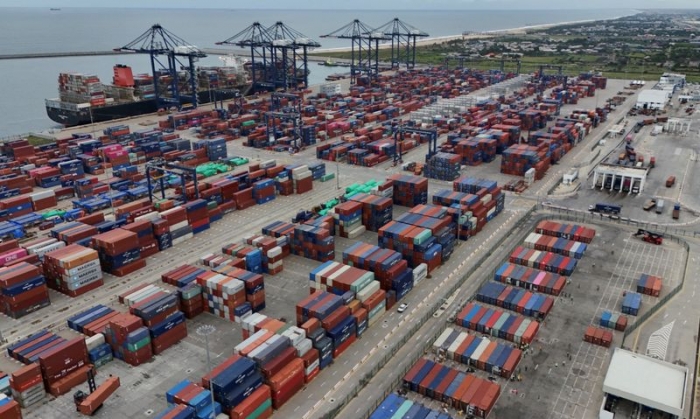Africa's push for local currency payments systems - once little more than an aspiration - is finally making concrete gains, bringing the promise of less costly trade to a continent long hobbled by resource-sapping dollar transactions.
But efforts to move away from the dollar face strong opposition and the threat of retaliation from U.S. President Donald Trump, who is determined to preserve it as the dominant currency for global trade.
The move by Africa to create payments systems that do not rely on the greenback mirrors a push by China to develop financial systems independent of Western institutions. Countries like Russia, which face economic sanctions, are also keen for an alternative to the dollar.
But while that movement has gained a sense of urgency due to shifting trade patterns and geopolitical realignments following President Trump's return to the White House, African advocates for payment alternatives are making their case based on costs.
"Our goal, contrary to what people might think, is not de-dollarisation," said Mike Ogbalu, chief executive of the Pan-African Payments and Settlements System, which allows parties to transact directly in local currencies, bypassing the dollar.
"If you look at African economies, you'll find that they struggle with availability for third-party global currencies to settle transactions," he said.
Africa's commercial banks typically rely on overseas counterparts, through so-called correspondent banking relationships, to facilitate settlements of international payments. That includes payments between African neighbours.
That adds significantly to transaction costs that, along with other factors like poor transport infrastructure, have made trade in Africa 50% more expensive than the global average, according to the UN Trade and Development agency.
It is also among the reasons so much of Africa's trade - 84%, according to a report by Mauritius-based MCB Group - is with external partners rather than between African nations.
"The existing financial network that is largely dollar-based has essentially become less effective for Africa, and costlier," said Daniel McDowell, a professor at Syracuse University in New York specialising in international finance.
HOMEGROWN SYSTEMS
According to data compiled by PAPSS, under the existing system of correspondent banks, a $200 million trade between two parties in different African countries is estimated to cost 10% to 30% of the value of the deal.
The shift to homegrown payments systems could cut the cost of that transaction to just 1%.
Systems like PAPSS allow a business in one country, Zambia for example, to pay for goods from another like Kenya, with both buyer and seller receiving payment in their respective currencies rather than converting them into dollars to complete the transaction.
Using currencies like the Nigerian naira, Ghanaian cedi or South Africa's rand for intra-Africa trade payments could save the continent $5 billion a year in hard currency, Ogbalu told Reuters.
Launched in January 2022 with just 10 participating commercial banks, PAPSS is today operational in 15 countries including Zambia, Malawi, Kenya and Tunisia, and now has 150 commercial banks in its network.
"We have also seen very significant growth in our transactions," Ogbalu said, without providing usage data.
The International Finance Corporation, the World Bank's private sector lending arm, has, meanwhile, started issuing loans to African businesses in local currencies.
It views the switch as imperative for their growth, relieving them from the currency risks of borrowing in dollars, said Ethiopis Tafara, IFC's vice-president for Africa.
"If they are not generating hard currency, a hard-currency loan imposes a burden that makes it difficult for them to succeed," he said.
GEOPOLITICS AND THE TRUMP FACTOR
Africa's campaign to boost regional payments systems has found a platform at the Group of 20 major economies, with South Africa leading the charge as holder of the G20's rotating presidency.
It held at least one session on boosting regional payments systems when South Africa hosted a meeting of G20 finance ministers and central bank governors. And South Africa wants it to follow up the talk with concrete actions. The next meeting of G20 finance officials is scheduled for mid-July.
"Some of the most expensive corridors for cross-border payments are actually found on the African continent," Lesetja Kganyago, South Africa's central bank governor, told Reuters during a G20 meeting in Cape Town in February.
"For us to function as a continent, it's important that we start trading and settling in our own currencies."
Talk of moving away from the dollar - either for trade or as a reserve currency - has drawn aggressive reactions from President Trump, however.
After BRICS - a grouping of nations including Russia, China, India and Brazil along with Africans like South Africa, Egypt and Ethiopia - weighed reducing dollar dependence and creating a common currency, Trump responded with threats of 100% tariffs.
"There is no chance that BRICS will replace the U.S. Dollar in International Trade, or anywhere else, and any Country that tries should say hello to Tariffs, and goodbye to America!," he wrote on Truth Social in January.
In the months since, Trump has demonstrated his willingness to use tariffsto pressure and punish allies and foes alike, a strategy that has upended global trade and geopolitics.
No matter its intentions in moving to more local currency transactions, Syracuse University's McDowell said Africa will struggle to distance itself from more politically motivated de-dollarisation efforts, like those led by China and Russia.
"The perception is likely to be that this is about geopolitics," he said.
Reuters


































































